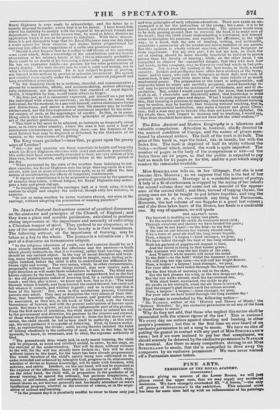Miss STRICKLAND tells us, in her titlepage, that she is
now become Mrs. MOODIE ; so we suppose that this is the last of her poetical productions. Marriage is a wonderful marrer of poetty. A lady in a fit of enthusiasm is stopped by the crying of her infant: the second volume does not come out on account of the appear- ance of the second child ; and then, instead of tagging rhyme, the young ones are to be taught to put letters together, and ring the changes on az, ci, co, cu,—sounds any thing but Parnassian. However, the last volume of our Sappho is a good last volume ; and if she thus takes leave of the Muses, her finale is a creditable one. By way of specimen, we will quote
THE REAPER'S SONG.
The harvest is nodding on valley and plain, To the scythe and the sickle its treasures must yield ; Through sunshine and shower we have tended the grain ; 'Tis ripe to our hand !—to the field—to the field 1 If the sun on our labours too warmly should smile,
Why a horn of good ale shall the long hours beguile. Then, a largess It' a largess l—kind stranger, we pray,
We have toiled through the heat of the long summer day With his garland of poppies red August is here, And the forest is losing its first tender green ;
Pale Autumn will reap the last fruits of the year,
And Winter's white mantle will cover the scene.
To the field I—to the field ! whilst the Summer is ours We will reap her ripe corn—we will cull her bright flowers.
Then, a largess ! a largess ! kind stranger, we pray,
For your sake we have toiled through the long summer day.
Ere the first blush of morning is red in the skies, Ere the lark plumes his wing, or the dew drops are dry, Ere the sun walks abroad, must the harvestman rise, With stout heart, unwearied, the sickle to ply : He exults in his strength, when the ale horn is crown'd, And the reaper's glad shouts swell the echoes around. Then, a largess ! a largess !—kind stranger, we pray, For your sake we have toiled through the long summer day !
The volume is concluded by the following notice- " Mr. NATHAN, author of the History and Theory of Music,' the Hebrew Melodies,' &c., has exclusive permission to set any of the line!' in these Poems to music."
Why do they not add, that those who neglect this notice shall be prosecuted with the utmost rigour of the law? This is curious! We every day see notices against shooting and hunting in other people's premises ; but this is the first time we ever heard of an exclusive permission to set a sow, to music. We have no idea of putting the gamut in contact with any part of Miss STRICKLANDIN verse; but if we were inclined to pay her that compliment, we should scarcely be deterred by the exclusive permission to NATHAN the musical. Are there so many. competitors striving to set Miss STRICKLAND to music, that she is compelled to drive away the composers by an exclusive permission ? We were never warned off a Parnassian manor before.


























 Previous page
Previous page